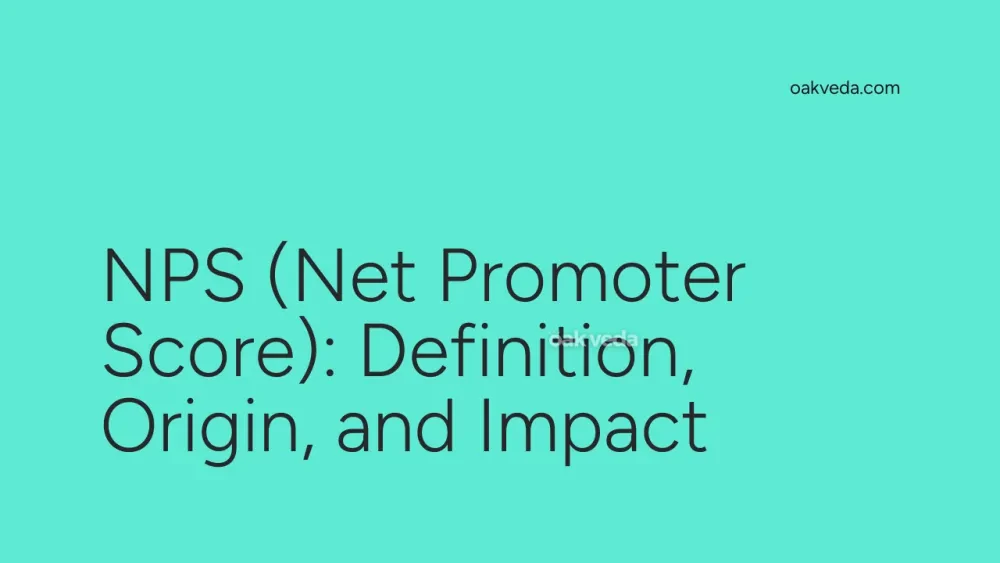
What is NPS (Net Promoter Score)?
NPS, or Net Promoter Score, is a widely used metric that measures customer loyalty and satisfaction. It's a simple yet powerful tool that helps businesses gauge their customers' likelihood to recommend their products or services to others. The NPS is based on a single question: "On a scale of 0 to 10, how likely are you to recommend our product/service to a friend or colleague?"
Origin and Development of NPS
The Net Promoter Score was introduced in 2003 by Fred Reichheld, a partner at Bain & Company, in his Harvard Business Review article "The One Number You Need to Grow." Reichheld's research showed that this simple metric could predict customer behavior and business growth more accurately than complex customer satisfaction surveys.
How NPS Works
The NPS system categorizes customers into three groups based on their responses:
- Promoters (score 9-10): Loyal enthusiasts who will keep buying and refer others
- Passives (score 7-8): Satisfied but unenthusiastic customers who may switch to competitors
- Detractors (score 0-6): Unhappy customers who can damage your brand through negative word-of-mouth
To calculate the NPS, subtract the percentage of Detractors from the percentage of Promoters. For example, if 50% are Promoters and 20% are Detractors, the NPS would be 30 (50% - 20% = 30%).
Types or Variations of NPS
While the classic NPS focuses on customer loyalty, variations have emerged to address different aspects of business:
- Employee NPS (eNPS): Measures employee satisfaction and loyalty
- Brand NPS: Assesses overall brand perception
- Touchpoint NPS: Evaluates specific customer interactions or touchpoints
Popular Examples of NPS
Many successful companies use NPS to drive growth and improve customer experience:
- Apple: Known for its high NPS scores, often above 70
- Amazon: Consistently maintains a high NPS, reflecting its customer-centric approach
- Netflix: Uses NPS to refine its content recommendations and user experience
Impact of NPS on Business Culture
NPS has significantly influenced business culture by:
- Simplifying customer feedback collection
- Focusing organizations on customer loyalty
- Encouraging a customer-centric approach across departments
- Providing a clear, actionable metric for improvement
Controversies or Debates Surrounding NPS
Despite its popularity, NPS has faced some criticism:
- Oversimplification: Some argue that a single question can't capture the complexity of customer relationships
- Cultural bias: The effectiveness of NPS may vary across different cultures and industries
- Manipulation: Companies might pressure employees to boost scores, potentially skewing results
How Brands and Influencers Use NPS
Brands and influencers leverage NPS in various ways:
- Identifying brand advocates: High-scoring customers can be engaged for testimonials or referral programs
- Improving products/services: Feedback from detractors helps pinpoint areas for improvement
- Benchmarking: Comparing NPS scores against competitors provides valuable industry insights
- Content creation: Positive NPS results can be used in marketing materials to build trust
Future Trends Related to NPS
As customer experience continues to be a key differentiator, NPS is evolving:
- AI-powered NPS: Machine learning algorithms are being used to analyze NPS feedback and predict customer behavior
- Real-time NPS: Continuous feedback collection allows for more timely responses to customer issues
- Integrated NPS: Combining NPS with other metrics for a more holistic view of customer experience
- Personalized follow-up: Using NPS data to tailor individual customer interactions and offers
FAQs about NPS
-
What's a good NPS score? While it varies by industry, generally, a score above 0 is considered good, above 50 is excellent, and above 70 is world-class.
-
How often should NPS surveys be conducted? It depends on the business, but quarterly or bi-annual surveys are common for tracking trends over time.
-
Can NPS predict business growth? Research suggests that companies with higher NPS scores tend to grow faster than their competitors, but it's not the only factor.
-
How can businesses improve their NPS? Focus on addressing issues raised by detractors, enhancing the experience for passives, and maintaining the satisfaction of promoters.
-
Is NPS suitable for all types of businesses? While widely applicable, NPS may need adaptation for certain industries or business models. It's most effective when combined with other metrics and qualitative feedback.
In conclusion, NPS has become a cornerstone metric for businesses aiming to improve customer loyalty and drive growth. Its simplicity and actionable insights have made it a popular tool across industries. As customer experience continues to be a key differentiator, NPS is likely to remain relevant, evolving with new technologies and methodologies to provide even more valuable insights into customer behavior and satisfaction.
You may be interested in:
- Target Audience: Definition, Origin, and Impact on Social Media
- Aesthetic: Definition, Origin, and Impact on Social Media
- DC (Dance Credit) on TikTok: Definition, Origin, and Impact
- Chronically Online: Definition, Origin, and Impact
- Fandom: Definition, Origin, and Impact on Social Media
- Social Media Bio: Definition, Origin, and Impact

